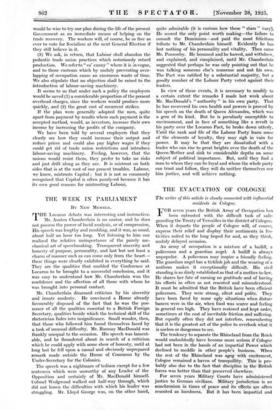THE WEEK IN PARLIAMENT
BY NEW MEMBER.
THE Locarno debate was interesting and instructive. Mr. Austen Chamberlain is no orator, and he does not possess the power of lucid analysis, or of compression. His speech was lengthy and rambling, and it was, as usual, about half an hour too long. Yet listening to him one realized the relative unimportance of the purely me- chanical art of speechmaking. Transparent sincerity and honesty of purpose, personality, and last but not least a charm of manner such as can come only from the heart— these things were clearly exhibited in everything he said. They are the qualities that enabled the Conference at Locarno to be brought to a successful conclusion, and it was easy to understand how Mr. Chamberlain won the confidence- and the affection of all those with whom he was brought into personal contact.
Mr. Chamberlain disarmed criticism by his sincerity and innate modesty. He convinced a House already favourably disposed of the fact that he was the pos- sessor of all the qualities essential to a British Foreign Secretary, qualities beside which the technical skill of the rhetorician fades into insignificance. Small wonder, then, that those who followed him found themselves faced by a task of Unusual difficulti. Mr. Ramsay MacDonald was frankly unequal to the occasion. His speech was lament- able, and he floundered about in search of a criticism which he could apply with some show of honesty, until at long last he fell upon a casual and obviously unprepared remark made outside the House of Commons by the Under-Secretary for the Colonies.
The speech was a nightmare of tedium except for a few sentences which were unworthy of any Leader of the Opposition and certainly of Mr. MacDonald himself. Colonel Wedgwood walked out half-way through, which did not lessen the difficulties with which this leader was struggling. Mr. Lloyd George was, on the other hand, quite admirable (it is curious how these " Stars " vary). He scored the only point worth making-7the failure to consult the Dominions—and paid the most felicitous tribute to Mi. Chamberlain himself. Evidently he has lost nothing of his personality and vitality, Then came Mr. Ponsonby. He hemined and he hawed, and withdrew, and explained, and *COmplained, until Mr. Chamberlain suggested that perhaps he was only pointing out that lie was talking someone else's . nonsense and not his own. The Pact was ratified by a sUbstantial .majority, but a goodly number of the Labour Party voted against their leaders. In view of these events, it is necessary to modify to a certain extent the remarks I made last week about Mr. MaeDonald's " authority " in his own' party. That he has recovered his own health and powers is proved by his speech on the death of Queen Alexandra, which was a gem of its kind. But he is peculiarly susceptible to environment, and in face of something like a revolt in his party over the Locarno Pact, he broke down utterly. Until the rank and file of the LabOur Party learn some of 'the elements of loyalty, they may sigh in vain for power. It may be that they are dissatisfied with' a leader who can rise to great heighti over the death of the Queen-Mother and sink to considerable .depths on, some subject of political importance. But, until they find a man to whom they can be loyal and whom the whole party can trust and follow, they will do neither themselves nor him justice, and will achieve nothing.






















































 Previous page
Previous page